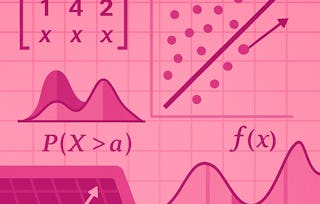Welcome to the Advanced Linear Models for Data Science Class 1: Least Squares. This class is an introduction to least squares from a linear algebraic and mathematical perspective. Before beginning the class make sure that you have the following:

Advanced Linear Models for Data Science 1: Least Squares

Advanced Linear Models for Data Science 1: Least Squares
This course is part of Advanced Statistics for Data Science Specialization

Instructor: Brian Caffo, PhD
31,070 already enrolled
Included with
190 reviews
Skills you'll gain
- General Mathematics
- Statistics
- R Programming
- Statistical Modeling
- Applied Mathematics
- Regression Analysis
- Statistical Analysis
- Data Modeling
- Mathematical Modeling
- Derivatives
- Data Science
- Linear Algebra
- Skills section collapsed. Showing 11 of 12 skills.
Details to know

Add to your LinkedIn profile
7 assignments
See how employees at top companies are mastering in-demand skills

Build your subject-matter expertise
- Learn new concepts from industry experts
- Gain a foundational understanding of a subject or tool
- Develop job-relevant skills with hands-on projects
- Earn a shareable career certificate

There are 6 modules in this course
We cover some basic matrix algebra results that we will need throughout the class. This includes some basic vector derivatives. In addition, we cover some some basic uses of matrices to create summary statistics from data. This includes calculating and subtracting means from observations (centering) as well as calculating the variance.
What's included
7 videos4 readings1 assignment
In this module, we cover the basics of regression through the origin and linear regression. Regression through the origin is an interesting case, as one can build up all of multivariate regression with it.
What's included
6 videos2 readings1 assignment
In this lecture, we focus on linear regression, the most standard technique for investigating unconfounded linear relationships.
What's included
8 videos2 readings1 assignment
We now move on to general least squares where an arbitrary full rank design matrix is fit to a vector outcome.
What's included
6 videos1 reading1 assignment
Here we give some canonical examples of linear models to relate them to techniques that you may already be using.
What's included
4 videos1 assignment
Here we give a very useful kind of linear model, that is decomposing a signal into a basis expansion.
What's included
6 videos2 assignments
Earn a career certificate
Add this credential to your LinkedIn profile, resume, or CV. Share it on social media and in your performance review.
Instructor

Offered by
Explore more from Probability and Statistics
 Status: Free Trial
Status: Free TrialJohns Hopkins University
 Status: Free Trial
Status: Free TrialUniversity of Pittsburgh
 Status: Preview
Status: PreviewSimplilearn
 Status: Free Trial
Status: Free TrialIllinois Tech
Why people choose Coursera for their career

Felipe M.

Jennifer J.

Larry W.

Chaitanya A.
Learner reviews
- 5 stars
63.68%
- 4 stars
24.73%
- 3 stars
7.36%
- 2 stars
3.15%
- 1 star
1.05%
Showing 3 of 190
Reviewed on Mar 4, 2018
Very thorough and rigorous. A great review for me.
Reviewed on Apr 29, 2017
Good mathematical rigour for the analysis of linear models. Builds some good intuition for the geometry of least squares which helps in model result interpretation.
Reviewed on Nov 6, 2017
Great, detailed walk-through of least squares. Linear Algebra is a must for this course. To follow the last part requires knowledge of matrix (eigen?)decomposition, which derailed me somewhat.

Open new doors with Coursera Plus
Unlimited access to 10,000+ world-class courses, hands-on projects, and job-ready certificate programs - all included in your subscription
Advance your career with an online degree
Earn a degree from world-class universities - 100% online
Join over 3,400 global companies that choose Coursera for Business
Upskill your employees to excel in the digital economy
Frequently asked questions
To access the course materials, assignments and to earn a Certificate, you will need to purchase the Certificate experience when you enroll in a course. You can try a Free Trial instead, or apply for Financial Aid. The course may offer 'Full Course, No Certificate' instead. This option lets you see all course materials, submit required assessments, and get a final grade. This also means that you will not be able to purchase a Certificate experience.
When you enroll in the course, you get access to all of the courses in the Specialization, and you earn a certificate when you complete the work. Your electronic Certificate will be added to your Accomplishments page - from there, you can print your Certificate or add it to your LinkedIn profile.
Yes. In select learning programs, you can apply for financial aid or a scholarship if you can’t afford the enrollment fee. If fin aid or scholarship is available for your learning program selection, you’ll find a link to apply on the description page.
More questions
Financial aid available,

